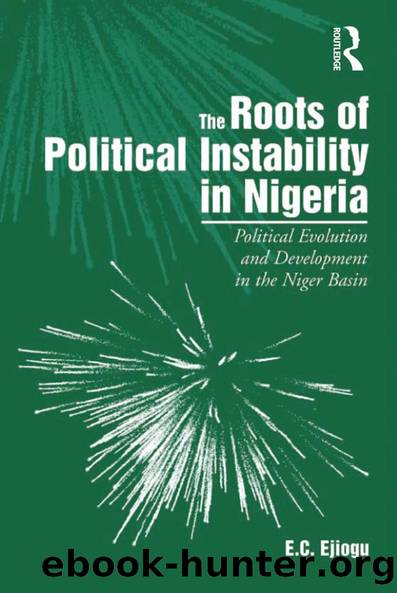The Roots of Political Instability in Nigeria by E.C. Ejiogu

Author:E.C. Ejiogu [Ejiogu, E.C.]
Language: eng
Format: epub
Tags: History, Africa, General
ISBN: 9781317016960
Google: aRWgCwAAQBAJ
Publisher: Routledge
Published: 2016-02-24T16:13:07+00:00
PART III
Advent and Prospects of a Beleaguered Supra-National State
Chapter 7
Authority Patterns and Governance in Colonial Nigeria
The British occupied the Niger basin gradually and in roughly six distinct stages that spanned the nineteenth century (Anene 1966, Dusgate 1985, Tamuno 1966, 1972). (i) The Yoruba Kingdom of Lagos was bombarded, annexed and made a Crown colony in the period 1851â61. (ii) The period 1861â90 witnessed the consolidation of British authority and the transformation of the Lagos Crown colony. (iii) In the period 1890â1914, the British embarked on a systematic alteration of the authority patterns that were established in the Crown colony. (iv) Officially, colonial rule was proclaimed in the rest of the Niger basin in the period 1896â1913. (v) Lugardism evolved in the upper Niger in the period 1900â12, and (vi) the period 1914â60 marked the transformation of colonial authority patterns in the entire Niger basin on the aegis of the Nigerian supra-national state.
Throughout the course of their intervention in the Niger basin, the British were confronted by a variety of issues that stemmed from a diversity of factors peculiar to the West African sub-region. Foremost amongst the diversity of factors were the distinct socio-political arrangements in each of the several nationalities that inhabit the Niger basin. Indeed, when taken either singly or collectively, most of the choices made by the British in their quest to build Nigeria were dictated and even forced on them by the diversity of those extraneous factors peculiar to the Niger basin and its diverse and distinct inhabitants.
In the initial stage, the British were only able to establish different administrative polities that incorporated a part of Yorubaland, Igboland, and Fulani-ruled Hausaland respectively. The Nigerian supra-national state is the eventual outcome of their extensive efforts to bring the Niger basin and its inhabitants under a single political arrangement.
Geography and historical factors that stemmed partly from the slave trade played their own crucial roles in Britainâs intervention in the Niger basin. Specifically speaking, the existence of a natural seaport in Eko (Lagos) and Britainâs resolve to enforce the abolition of the slave trade on Africaâs West Coasts are some of the factors that helped to expose the Yoruba kingdom of Eko (which the Portuguese called Lagos) to British annexation. The natural seaport at the lagoon entrance attracted the Royal Navy to make Lagos a staging point in Britainâs anti-slavery endeavors on the West Coast of Africa. In turn the presence and protection of the Royal Navy then attracted freed slaves and their descendants from Freetown, Sierra Leoneâthe Saroâand Brazilâthe Amaroâto resettle themselves in Lagos and its environs. The freed slaves and what they represented constituted the most important factor that favored the evolution of British authority in the Kingdom of Lagos.
The establishment of Crown colony rule in Lagos made it easy for the British to expand their authority into the rest of Yorubaland mostly âthrough a series of judicial agreements signed with a number of indigenous rulersâ (Adewoye 1971: 627). Thus, unlike in Igboland and Hausaland, in Yorubaland the
Download
This site does not store any files on its server. We only index and link to content provided by other sites. Please contact the content providers to delete copyright contents if any and email us, we'll remove relevant links or contents immediately.
| Central Africa | East Africa |
| North Africa | Southern Africa |
| West Africa | Algeria |
| Egypt | Ethiopia |
| Kenya | Nigeria |
| South Africa | Sudan |
| Zimbabwe |
Goodbye Paradise(2971)
Men at Arms by Terry Pratchett(2408)
Tobruk by Peter Fitzsimons(2064)
Pirate Alley by Terry McKnight(1910)
Arabs by Eugene Rogan(1837)
Borders by unknow(1789)
Belonging by Unknown(1472)
The Biafra Story by Frederick Forsyth(1325)
It's Our Turn to Eat by Michela Wrong(1305)
Botswana--Culture Smart! by Michael Main(1238)
A Winter in Arabia by Freya Stark(1225)
Gandhi by Ramachandra Guha(1196)
Coffee: From Bean to Barista by Robert W. Thurston(1183)
Livingstone by Tim Jeal(1152)
The Falls by Unknown(1142)
The Source by James A. Michener(1135)
The Shield and The Sword by Ernle Bradford(1101)
Egyptian Mythology A Fascinating Guide to Understanding the Gods, Goddesses, Monsters, and Mortals (Greek Mythology - Norse Mythology - Egyptian Mythology) by Matt Clayton(1088)
Africa: Altered States, Ordinary Miracles by Richard Dowden(1078)
